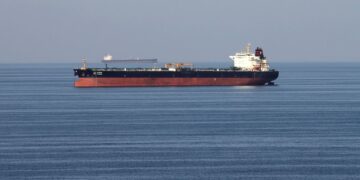At first blush, Santos looks to have a lot more hurdles in front of it than a runner in the Grand National — and for that matter, the hurdles are a lot steeper too.
The Santos board has had the company on the block for a while, and the $36 billion bid from a consortium of the Abu Dhabi National Oil Company (ADNOC) and US private equity firm, Carlyle, is testimony to the board’s sales pitch.
Understandably, the lure of cold hard cash upfront at a 28% premium to Friday close is particularly alluring to the board and many shareholders.
On figures from the broker E&P, the offer implies Brent crude at $US78/a barrel and the Aussie dollar at 70 cents.
It would have looked even juicier a week ago before the oil price rallied around 15%.
There’s been a fair bit of speculation in recent years about potential M&A activity, and even an official approach from Santos’s much larger Australian rival Woodside, which was duly rebuffed as being a tad too opportunistic.
Names being mentioned as potential bidders included the likes of Total, BP and Conoco Phillips — all had reasons to be interested, such as shortage of LNG (BP) or geographical overlap (Total in PNG).
However, it was the freshly minted, deep pocketed XRG consortium that interested the Santos board.
While the board, in its statement to ASX this morning, may be planning to unanimously recommend the XRG to its shareholders (subject to the usual niceties such as the absence of a superior bid and a tick from an independent expert), that doesn’t mean the shareholders will get the $8.89 in the pockets.
The bid needs to clear a number of regulatory hurdles.
By Santos’s reckoning there’s the Foreign Investment Review Board, ASIC, the National Offshore Petroleum Titles Administrator, the PNG government’s securities, as well as competition commissions, and even a US foreign investment regulator.
Santos didn’t mention the South Australian government, but it has already said it plans to get involved, has levers it can pull, and, all up, was not overly impressed.
Santos also sidestepped the issue of the federal government and its veto, something Woodside could tell it all about.
Back in 2001, Shell’s pursuit of Woodside was blocked by that ardent free marketeer, and federal Liberal treasurer, Peter Costello. He didn’t even bother checking with the FIRB.
Mr Costello argued foreign ownership of Woodside was not in the national interest. Full stop.
How a foreign state-owned enterprise like ADNOC and its new buddies from the world of private equity will go with a Labor treasurer, and an administration that very publicly wants to claw back key infrastructure like the Port of Darwin from foreign owners/leaseholders, is not difficult to imagine.
That hurdle looks much more like a massive brick wall.


















